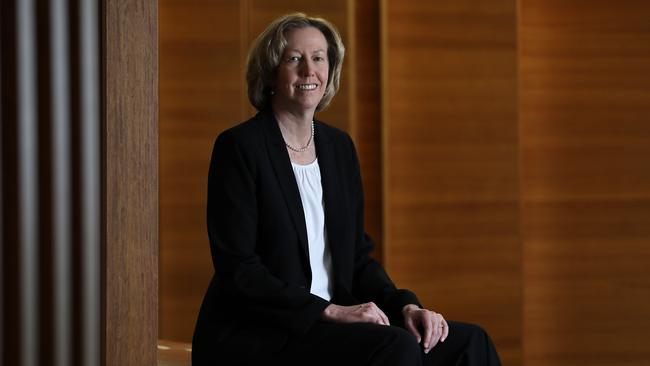Gas consistent with net zero emissions aim: Woodside
Woodside faces new carbon constraints on its flagship Pluto LNG project after the West Australian government demanded tougher standards for its expansion.

Major oil and gas investors including giant Woodside Petroleum argue the sector could develop new gas projects while also achieving net zero emissions targets, even as they face intense pressure from activist investors to halt their expansion.
The comments came as environmental groups savaged a decision by Western Australia’s first climate action minister on Tuesday to sign off on a $16bn expansion of Woodside Petroleum’s Pluto liquefied natural gas project in the Pilbara. Opponents said its abatement plans would only shave 2 per cent off the project’s greenhouse footprint once scope three emissions – generated when the gas from the project is eventually burned – were included.
A landmark International Energy Agency report found no oil or gas fields should be opened up if the world is to reach net-zero emissions by 2050, but Woodside said it could develop the giant Scarborough project to feed strong demand among Asian buyers while also hitting emissions targets.
“The Scarborough reservoir contains almost no carbon dioxide which makes it particularly attractive in a decarbonising world. It’s one of the lowest carbon sources of LNG in Australia,” Woodside’s interim chief executive Meg O’Neill told the Credit Suisse Australian Energy Conference on Tuesday.
“Scarborough is a resource very well suited to our times. Successful LNG producers will need to be low cost and low carbon.”
The WA government has set targets of 30 per cent lower emissions by 2030 and net zero by 2050, covering both the existing Pluto plant and a planned expansion which Woodside hopes to sign off in the second half of this year as part of its Scarborough development.
Under Woodside’s plans, the existing Pluto LNG plant would double in size and start processing gas from the currently undeveloped Scarborough gas field, owned by Woodside and BHP.
While Woodside’s latest emission reduction commitments go beyond what was originally planned under the Pluto expansion’s original approvals, they are still well shy of the full offsets for major projects flagged two years ago by WA’s independent Environmental Protection Authority.
Those recommendations were ultimately watered down after an intervention from the state government, which subsequently announced a plan for net zero emissions by 2050.
Former WA treasurer Ben Wyatt, who retired from politics at the March state election, was named as a director of Woodside just last week.
The Perth producer said adverse climate votes against big oil producers – along with the IEA declaration – were simply part of the ongoing energy transition that had been under way for a number of years.
“I don‘t see it as a watershed moment but I do see it as a significant continuation of the trend that the industry has been on. We as investors in this space need to be doing our part to decarbonise,” Ms O’Neill said.
Woodside said it was committed to the new targets and would adopt technology “considered to be best practice for LNG developments in Australia, implementing operational improvements and offsetting all reservoir carbon dioxide.”
Scott Morrison has been under pressure to boost Australia’s response to climate change after US President Joe Biden said there was a “moral imperative” to take action while British Prime Minister Boris Johnson has pushed G7 leaders to back a plan to help developing countries decarbonise their economies and limit global warming.
Australia’s oil and gas industry has lagged Europe’s faster move to cleaner forms of energy but remained ahead of the US, according to the Woodside chief.
“I think what we saw in the US was the confluence of AGM season where two of the biggest producers had AGMs in the same week, so they both had some actions taken by their shareholders. In many ways this is a trend that we’ve been aware of for a very long period of time,” Ms O’Neill said.
“It’s a trend that in many ways European producers were at the leading edge of. Australia has probably been in second place in terms of the pace of energy transition and the pressures and the US companies have been lagging. So in some ways these are signals the US producers should have seen coming from what’s been happening from European counterparts.”
Japanese contracting giant Chiyoda – which built the Ichthys LNG project in Darwin, the PNG LNG project and recently won a $16bn expansion in Qatar – also hit back at the idea a sudden change had hit the hydrocarbons industry.
“I wouldn’t call it a watershed moment. Everyone has been expecting it to happen and it’s just that was quite a big media event and really all companies have been expecting something and all companies have been working in the background to get ready for that day,” Chiyoda Oceania chief executive Andrew Tan told the conference.
“The young environmentalists will call it a watershed moment but I think most companies that have been in this business have been expecting it for a while.”
Australian corporations are increasingly under pressure on climate change as institutional investors such as Climate Action 100+, backed by Australian superannuation funds, use their power to hold companies to account.
Shell, owner of major Queensland and West Australian LNG projects, was found by a Dutch court partially responsible for climate change and ordered to sharply cut carbon emissions.
Exxon, operator of the huge Bass Strait gas fields, reeled as a tiny activist hedge fund won two board seats after shareholders backed its call for management to accelerate efforts to combat global warming.
Chevron, which runs the giant Gorgon and Wheatstone LNG plants in Western Australia, was also hit with a vote to cut emissions released by its customers, known as Scope 3.


To join the conversation, please log in. Don't have an account? Register
Join the conversation, you are commenting as Logout